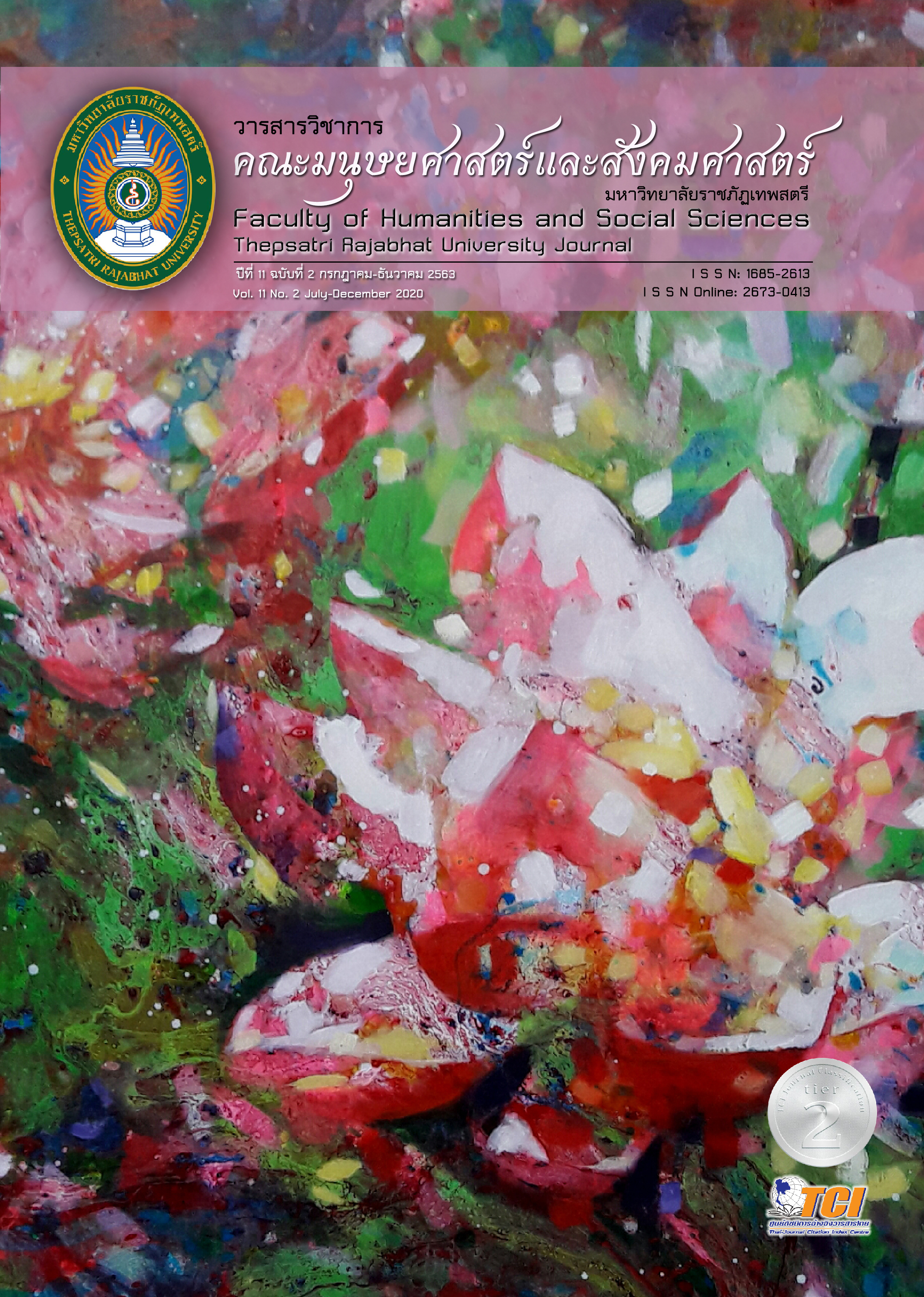Creating Motivation for Local Thai Gastronomy Tourism to Strengthen Immunity in the Way of a Healthy Community after Covid-19 Pandemic. การสร้างแรงจูงใจในการท่องเที่ยวเชิงอาหารไทยท้องถิ่นเสริมภูมิต้านทานในวิถีชุมชนสุขภาพ หลังการแพร่ระบาดของไวรัส Covid-19
Main Article Content
Abstract
This academic article is to study the motivation of tourists in local Thai gastronomy tourism, ways of community health. The motivation of tourists is the purpose of eating food to affect health in the beginning of the year 2020, tourists from around the world have been affected by health from the outbreak of the virus that occurs around the world. Causing tourists to turn their attention to health tourism clearly tourists consider that food tourism in Thailand is a good way to improve health through nutritious food. Comes from the famous Thai herbs in order to prevent or treat various diseases, therefore, the joint arrangement between local Thai gastronomy tourism, healthy community ways to be effective and well-known among Thai and foreign tourists is Must come from the cooperation of the people in the community to present a variety of ingredients for cooking. Variety of Thai food in each area Thai cooking methods by using local ingredients as the main selling point in determining local tourism food activities in parallel with Thai health tourism.
Downloads
Article Details
The content and information presented in articles published in the Academic Journal of the Faculty of Humanities and Social Sciences, Thepsatri Rajabhat University, are solely the opinions and responsibilities of the respective authors. The editorial board of the journal neither necessarily agrees with nor assumes any responsibility for such content in any manner whatsoever.
All articles, information, content, and images published in the Academic Journal of the Faculty of Humanities and Social Sciences, Thepsatri Rajabhat University, are the copyright of the journal. Any person or organization wishing to reproduce, disseminate, or otherwise utilize all or any part thereof must obtain prior permission from the Academic Journal of the Faculty of Humanities and Social Sciences, Thepsatri Rajabhat University.
References
การท่องเที่ยวแห่งประเทศไทย. (2551). การท่องเที่ยวเชิงการแพทย์ในประเทศไทย. สืบค้น กุมภาพันธ์ 25, 2562, จาก www.elfhs.ssru.ac.th/phanitthat_pu/mod/resource/view.php.
ไทยรัฐออนไลน์. (2563). ไวรัสโควิด-19 ฉุดท่องเที่ยวลงเหว ระบาด 3 เดือน บาท. สืบค้น มีนาคม 22, 2563, จาก https://www.thairath.co.th/news/business/market-business/1763095.
ญาณภา บุญประกอบ สิริพร เขตเจนการ โยธิน แสวงดี และจักรวาล วงศ์มณี. (2560). อาหารพื้นถิ่นกับกลไกในการส่งเสริมการท่องเที่ยวเชิงสร้างสรรค์: กรณีศึกษากลุ่มชาติพันธุ์ลาวครั่ง จังหวัดชัยนาท. วารสารวิทยาลัยดุสิตธานี, 11(พิเศษ), 93-108.
เบญจมาภรณ์ ชำนาญฉา. (2561). การท่องเที่ยวเชิงอาหาร: ศักยภาพและความได้เปรียบของประเทศไทย. วารสารสมาคมสถาบันอุดมศึกษาเอกชนแห่งประเทศไทยในพระราชูปถัมภ์ สมเด็จพระเทพรัตนราชสุดาฯ สยามบรมราชกุมารี, 24 (1), 103-116.
มรุต จิรเศรษฐศิริ. (2563). เปิดเมนูอาหารไทย กินสู้โรค โควิด-19. สืบค้น กันยายน 9, 2563, จาก https://dmh.go.th/news-dmh/view.asp?id=30233.
วรรณา วงษ์วานิช. (2546). ภูมิศาสตร์การท่องเที่ยว (พิมพ์ครั้งที่ 2). กรุงเทพฯ: มหาวิทยาลัยศรีนครินทรวิโรฒ ประสานมิตร.
วรุณรัตน์ คัทมาตย์. (2563). 7 อาหารไทยต้าน 'โควิด-19' เปิดสรรพคุณเด็ดที่ช่วยป้องกันไวรัส. สืบค้น กันยายน 9, 2563, จาก https://www.bangkokbiznews.com/news/detail/871359.
สุนีย์ วัฑฒนายน. (2557). 6 อาหารท้องถิ่น วัฒนธรรมการกินแบบพื้นบ้าน สืบสานสู่อาเซียน. Princess of Naradhiwas University Journal of Humanities and Social Sciences, 34-44.
สัญญา สัญญาวิวัฒน์. (2543). ทฤษฎีสังคมวิทยา: เนื้อหาและแนวการใช้ประโยชน์เบื้องต้น. กรุงเทพฯ: สำนักพิมพ์แห่งจุฬาลงกรณ์มหาวิทยาลัย.
ศูนย์วิจัยกสิกรไทย. (2563). โควิด-19 ฉุดเศรษฐกิจไทย ปี 63. สืบค้น มีนาคม 22, 2563, จาก https://www.kasikornresearch.com/th/analysis/k-econ/economy/Pages/Covid-ThaiEco-050363.aspx.
องค์การบริหารการพัฒนาพื้นที่พิเศษเพื่อการท่องเที่ยวอย่างยั่งยืน. (ม.ป.ป.). การท่องเที่ยวเชิงอาหาร. สืบค้น กุมภาพันธ์ 25, 2562, จาก www.dasta.or.th/th/.../840_ da12fl2c9915698bd10e50c811eba 772.
Cohen, E., & Avieli, N. (2010). Food tourism: Attraction and impediment. Annals of Tourism Research, 31(4), 755-778.
Douglas, P. (2001). Tourist Development. London: Pitman.
Hall, M.C. (2003). Food Tourism Around the World. Management and markets. Retrieved February 25, 2019, from http://shora.tabriz.ir/Uploads/83/cms/user/File/657/E_Book/ Tourism/ Food%20Tourism.pdf.
Hall, C.M. & Mitchell, R. (2000). We are what we eat: Food, tourism and globalization. Tourism Culture and Communication, 2, 29-37.
Hall, C.M. & Sharples, L. (2003), The consumption of experiences or the experience of Consumption. Retrieved February 25, 2019, from https://www.taylorfrancis.com/books/ e/9780080477862/ chapters/10.4324/9780080477862-9.
Kesimoglu, A. (2015). A Reconceptualization of Gastronomy as Relational and Reflexive. Hospitality and Society, 5(1), 71-91.
Ritchie, J. R. & Crouch, G. I. (2003). A model of destination competitiveness/sustainability: Brazilian Perspectives. Retrieved February 25, 2019, from http://www.scielo.br/pdf/ rap/v44n5/v44n5a03.pdf.
Santich, B. (1996). Looking for flavour. Kent Town: Wakefield.
Scarpato, R. (2002). Gastronomy as a tourist product: The perspective of gastronomy studies, in A.M. Hjalager and G. Richards (eds.), Tourism and gastronomy. Retrieved February 25, 2019, from https://www.researchgate.net/publication/305386515_ Gastronomy_as_a_tourist_product_The_perspective_of_gastronomy_studies.
United Nation Educational, Scientific and Cultural Organization (UNESCO). (2008). The 2008 Santa Fe UNESCO International Conference on Creative Tourism in Santa Fe. Retrieved February 25, 2019, from https://unesdoc.unesco.org/ark:/48223/pf0000159811.
World Tourism Organization. (2012). Global report on food tourism: AM report volume four. Retrieved February 25, 2019, from https://urbact.eu/sites/default/ files/import/Projects/ Gastronomic_Cities/outputs_media/Food_tourism.pdf.


